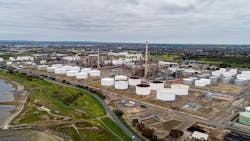Viva Energy on track with Geelong refinery’s ULSG project
Vitol Holding BV-backed Viva Energy Group Ltd. is progressing with its previously announced upgrading project to enable ultralow-sulfur gasoline (ULSG) production at Viva Energy Australia Pty. Ltd.’s 120,000-b/d Geelong refinery adjacent to Corio Bay, about 50 km west of Melbourne, in Victoria, Australia (OGJ Online, Apr. 14, 2022).
McDermott International Ltd.’s wholly owned CB&I has completed fabrication of and shipping for three out of five process assembly unit (PAU) modules that form a critical part of the Geelong refinery’s gasoline masterplan project, the parent company said on Nov. 18.
The PAUs—which were manufactured and shipped from CB&I fabrication site in Kasemphol, Thailand—will be implemented in the new ULSG plant included under the upgrading project, McDermott said.
The recent shipment follows CB&I Thailand’s previous production and shipment of two pipe rack (PAR) modules for the ULSG project in March 2024, the company confirmed.
CB&I’s began its work on the Geelong project—including fabrication of five PAUs and two PARs—in first-quarter 2023, with the final shipment consisting of the remaining PAUs scheduled to ship to the refinery by yearend-2024, McDermott said.
Additional details regarding the value or scope of the order were not revealed.
ULSG upgrading project
First announced in 2021 and approved in April 2022, Viva Energy’s ULSG upgrading project is designed to improve the quality of gasoline produced at the refinery, which in turn will help reduce vehicle emissions and improve the site’s crude processing flexibility.
Previously estimated at an overall investment of about $300 million (Aus.)—or about $222 million—approval of the project followed an award of $125 million to Viva Energy under the Australian Federal Government’s refinery upgrades program (OGJ Online, May 24, 2021).
As of yearend 2023, Viva Energy said that it had received all regulatory approvals for the project and already started construction for targeted completion and commissioning sometime during second-half 2025.
Following the federal government’s December 2023 announcement that fuel quality and noxious vehicle emissions standards would come into effect from December 2025 to ensure Australia’s fuel quality aligns more closely with international standards, Viva Energy said it expanded the project to certify that—in addition to all of Geelong’s ULSG conforms to 10 ppm sulfur content—aromatics limits of the refinery’s RON95 mid-grade gasoline production conforms to the pending legislation’s stricter requirement of less than 35%.
According to its yearend 2023 report, Viva Energy anticipates a combined investment of about $350 million for both the ULSG project and the additional aromatics requirements, “of which about $150 million is slated to be funded by the Federal Government,” the company said.
Both the ULSG and aromatics upgrades are part of Viva Energy’s ongoing transformation of the Geelong refinery into a modern energy hub that supports Australia’s energy security while also playing an important role its energy transition, according to the operator.
While the Geelong refinery has potential to play a key role in the manufacturing and distribution of lower carbon and renewable fuels—as well as for recycling waste plastics—in the long term, Viva Energy said its near-term plans already include enabling the refinery to co-process waste and biogenic feedstocks, with potential for establishing dedicated processing capacity at the site for renewable fuels also now under discussion.
Details on renewable fuel projects at the refinery have yet to be revealed, but Viva Energy did confirm in its 2024 half-year results presentation to investors that it had undertaken engineering design for infrastructure to store and co-process biogenic feedstocks at Geelong site.
About the Author
Robert Brelsford
Downstream Editor
Robert Brelsford joined Oil & Gas Journal in October 2013 as downstream technology editor after 8 years as a crude oil price and news reporter on spot crude transactions at the US Gulf Coast, West Coast, Canadian, and Latin American markets. He holds a BA (2000) in English from Rice University and an MS (2003) in education and social policy from Northwestern University.

